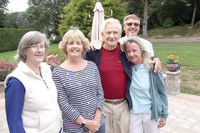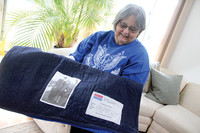By JOHN HOWELL Harry Olsen, now 93, although that seems unbelievable, is not one to be idle. Not even following an accident last week at Lowe's where a pile of building material fell, knocking him to the ground, cutting his hand, bruising his leg and
This item is available in full to subscribers.
We have recently launched a new and improved website. To continue reading, you will need to either log into your subscriber account, or purchase a new subscription.
If you are a current print subscriber, you can set up a free website account by clicking here.
Otherwise, click here to view your options for subscribing.
Please log in to continue |
|


Harry Olsen, now 93, although that seems unbelievable, is not one to be idle. Not even following an accident last week at Lowe’s where a pile of building material fell, knocking him to the ground, cutting his hand, bruising his leg and side and immobilizing his right arm; he wasn’t going to miss a party at his son, JessieMacLean’s, home in North Kingstown.
The accident meant his daughter, Marie Palmer, would have to pick him up from his home on Grand View Drive overlooking Apponaug Cove. He wouldn’t be driving one of his cars. That was part of the plan.
What he didn’t know was that he would be meeting Terri Heywood for the first time and not since his wife, Jackie, died would he find himself crying.
The party to see Jessie’s new patio furniture was all part of a ploy to bring the family together so that Harry might be presented a Quilt of Valor for his service in the Merchant Marines during World War II. Heywood, of Warwick, is the only active Rhode Island member of the Quilts of Valor, a national volunteer organization that sews quilts for veterans. She would love to have company on her mission to recognize veterans.
She said she loves the “surprise” of presenting a quilt, and that was the case Sunday.
What did it for Harry was the photograph, transferred to cloth, that Heywood had sewn on the back of the quilt. Harry identified it immediately as being taken in 1944 in the Japanese Garden of Roger Williams Park with the casino in the background. Standing together, Harry and Jackie are looking at the camera. The picture was taken not long after Harry signed up with the Merchant Marines at the age of 17.
Harry wanted to follow in the path of his father, Harry Sr., who was the captain of a Standard Oil tanker, and he knew if he waited until he was 18 he could have been drafted and sent just about anywhere. With an affinity to the sea and boats – Harry has had lots of them and he still loves sailing – he wanted to serve on a boat during the war effort.
He was assigned to Algic, “an old rust pot,” in the Atlantic Theater where he was a quartermaster and steered the ship. While aboard he developed a hernia and was sent to a Marine hospital, where the operating surgeon, “told me, ‘I’m going to do a Hollywood job.’” Harry wondered what that meant and the surgeon explained the incision would be no bigger than a teaspoon. Harry was conscious for the procedure, and as they were sewing him up the doctor held up a long stringy tissue announcing that while working on the hernia he removed his appendix as a bonus.
During his recovery, the Algic struck a mine in the French port of Le Havre, killing a number of seamen in the section of the craft where Harry would have been.
“I lost my appendix, but that saved my life,” Harry says with a smile.
Harry also served on the Warrior, a C-2 Victory ship carrying ammunition as part of an Atlantic convoy that ran into a severe storm. Harry believes the cargo was inappropriately stowed, causing the ship “to crack in half” in the heavy seas. The convoy proceeded leaving the wounded Warrior that eventually limped back to New York.
He finally was assigned to a “brand new” T-2 tanker out of Mississippi on a trip that would take him around the world.
After Germany surrendered, the tanker, which was carrying six million gallons of aviation fuel, crossed into the Pacific using the Panama Canal. It’s a trip Harry wants to make again, only this time from west to east. He has plans on doing it next year with his son, Jessie.
The tanker reached the Philippines when the war came to an end.
“When they dropped the bomb, I was happy,” he said, thinking of how many would have died had the Americans invaded Japan.
Then began a six-month voyage to deliver the fuel to ports around the globe that eventually took him through the Suez Canal into the Mediterranean Sea and across the Atlantic.
Following the war, Harry wanted to attend the Rhode Island School of Design, but the G.I. Bill was not extended to merchant mariners. Harry took a job as a draftsman and worked his way up in manufacturing. Harry went into “plastics.” He put his ability to design and build to work in the medical equipment industry, patenting several products and going on to become vice president of Superior Plastics that manufactured disposal medical products such as catheters that are still used today. He retired in 1994, but he never put aside his love for building things or, as it turned out, for boats and Narragansett Bay.
“My engine is still running. I didn’t know that I would live this long,” he said. “I try not to brag about old age, but I’m happy to have it.”
Last year, Harry told his four children he was going to spend some of their inheritance and took them all, with the exception of Jessie, who couldn’t make it, on a two-week trip to Norway. He pulls out his cell phone, working it with his left hand as his right arm still bothers him from the Lowe’s accident. He flips through photos of fiords, waterfalls and the midnight sun as they cruised above the Arctic Circle. Family gathered around him. He has eight grandchildren and four great-grandchildren – a fifth will be arriving soon.
“I still have a lot of things I want to do,” he says.
On his list is to do battle with Lowe’s if that’s what it takes.
Harry was walking past the stacked synthetic building materials when the lot came crashing down. It was treated like a common mishap. He said an employee told him a safety strap had not been secured. A rescue took him to the hospital. No one called from Lowe’s to see how he was. He said there have been no calls from the company.
He’s angry, saying he never would have let something like that happen in his manufacturing operation. He aims to take action, not for personal benefit, but “so it doesn’t happen to somebody else. It should not have happened,” he said.
He becomes just as animated when thinking of World War II and what the country and its military endured.
“People don’t have a sense of what we went through. What bothers me is that people don’t have more respect for what happened in the past.”
Perhaps Harry realized the irony of what he was saying. He stopped and looked down at the quilt that now had been neatly folded.
Indeed, his contribution is recognized, and for that he cried.
Comments
No comments on this item Please log in to comment by clicking here